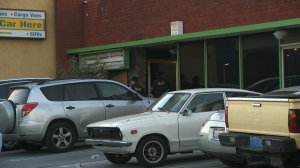California regulators mounted dozens of raids against illegal marijuana retailers in Los Angeles this week, the largest crackdown to date against the city’s thriving black market, officials announced Friday.
The state has been under pressure from California’s legal industry to do more to stop the underground pot economy, which in Los Angeles and other cities often operates in plain sight. According to some estimates, roughly 75% of sales in the state remain under the table, snatching profits from legal storefronts.
Investigators from the state Bureau of Cannabis Control and the Department of Consumer Affairs’ Cannabis Enforcement Unit served search warrants at 24 unlicensed shops from Tuesday through Thursday. They seized $8.8 million in cannabis products, confiscated nearly 10,000 illegal vape pens and $129,000 in cash, the bureau said.
The crackdown was praised by the United Cannabis Business Association, a Los Angeles-based industry group that has been urging the state to do more to shut down rogue operators.
“For a long time we have been playing a game of whack-a-mole, targeting and shutting down a small handful of illegal shops at a time, only to have them reopen days later in the same location or down the street,” said Jerred Kiloh, who heads the group.

He called the raids “the type of systematic action required” to combat the vast illegal market. “Every day, illegal operators are distributing products that are not tested, taxed or tracked by the state, putting not only the ongoing vitality of the legal industry at risk, but also the health and well-being of Californians,” Kiloh said in a statement.
California kicked off broad legal sales on Jan. 1, 2018. But the illegal market has continued a bustling business, in part because consumers can avoid steep tax rates by buying in unlicensed dispensaries.
But there’s a trade off for saving a buck. Illegal products have not met strict state testing standards and could be tainted by mold, pesticides, heavy metals — even human waste.
The state’s top cannabis regulator, Lori Ajax, signaled that more was to come. “We look forward to working with local jurisdictions and law enforcement as we continue to shut down unlicensed operators,” she said.












